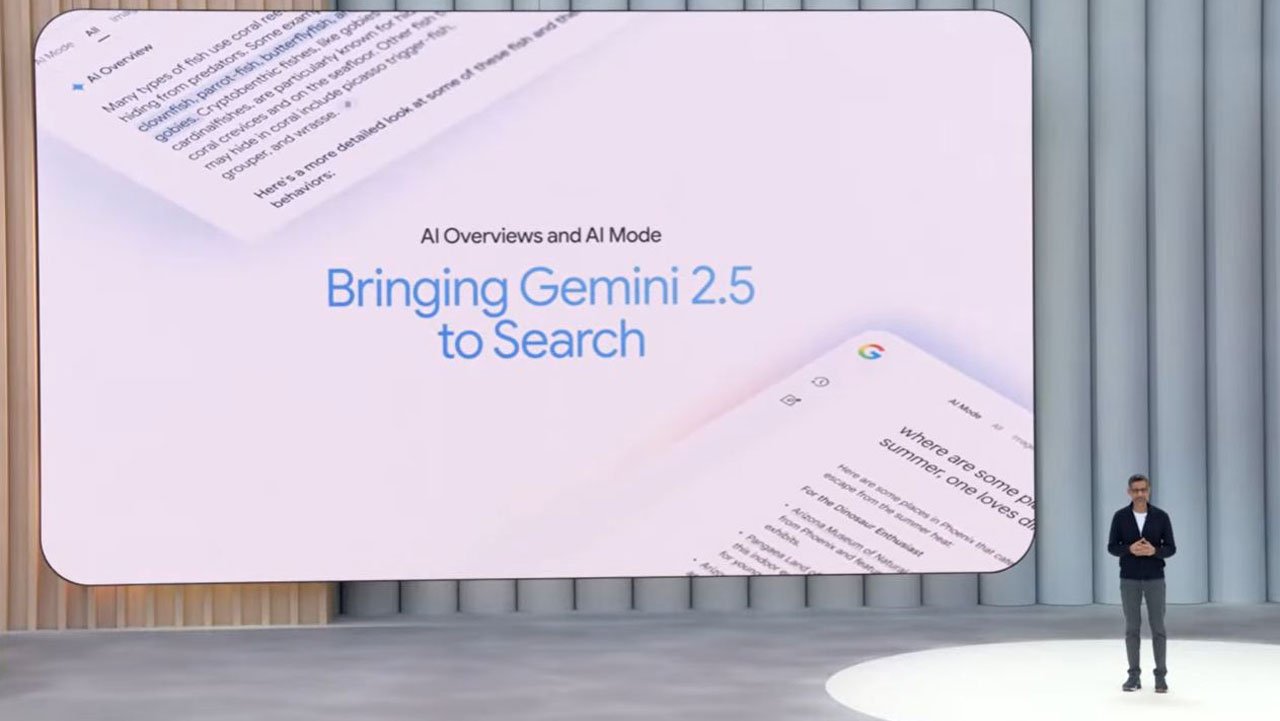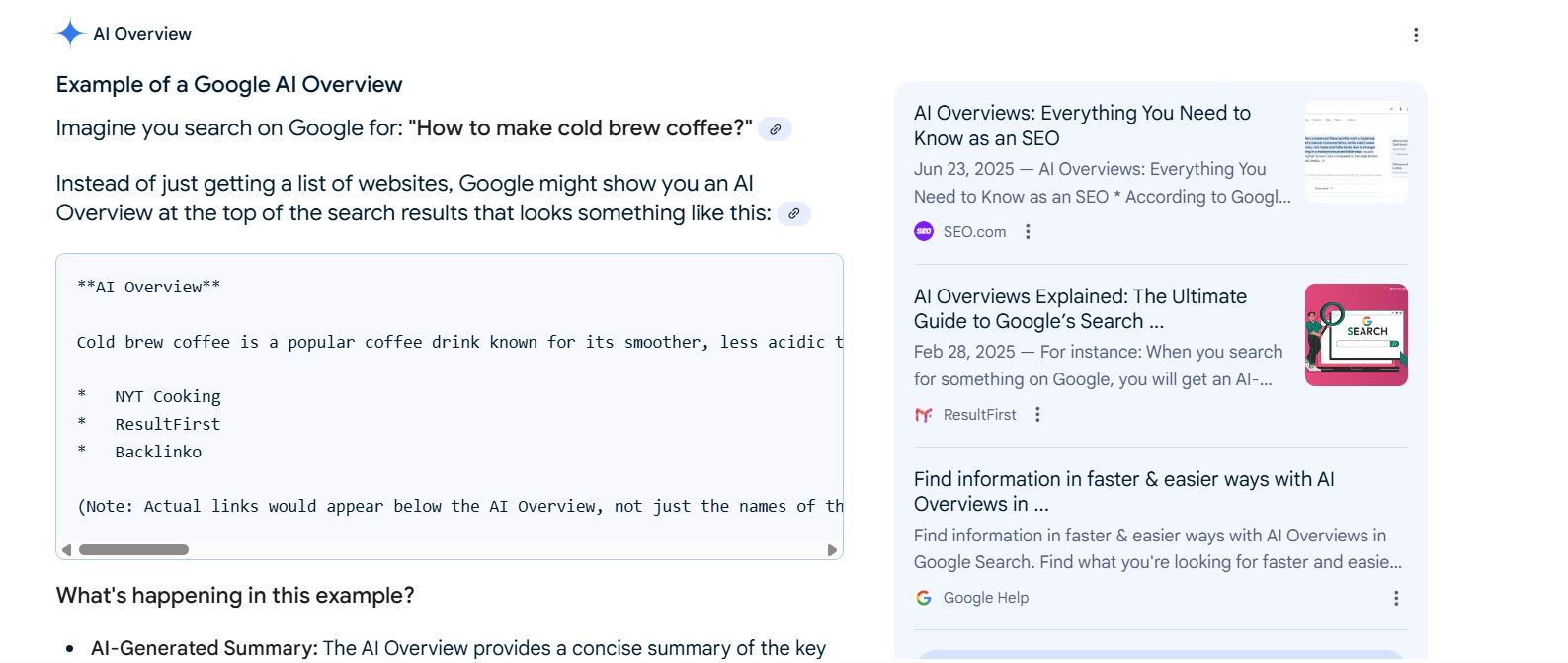(Above) Google CEO Sundar Pichai gives introduction to Google Search's new AI-forward roadmap at Google I/O 2025.
We're Seeing a Permanent Change in SEO Marketing: Here's What You Need to Know
If your website traffic has taken a hit recently, you're not alone. Google has made major changes to how search works, and it’s having a real impact on how people find (or don’t find) your business online.
Let’s walk through what changed, what it means for your website, and how you can mitigate traffic loss.
Full Context: SEO was Born From a 2003 Google Search Algorithm Update to Fight Spam
In late 2003, Google released the Florida Update on their Search service. This was a turning point for Google Search, as it cracked down on keyword stuffing, link farms, and other spammy tactics. Thousands of websites lost visibility almost overnight — including major brands.
That update marked the beginning of “white-hat SEO,” where websites began following Google’s guidelines in order to rank properly. Up until 2014, Google’s Webspam Team liaison, Matt Cutts, provided regular guidance via YouTube videos to marketers on how to avoid having their websites penalized. His updates and insights helped many website owners and marketers better understand Google’s algorithm standards.
Over twenty years, SEO has remained a cornerstone strategy for Internet marketing, but the SEO landscape is permanently shifting. This time, it's not just about content quality or links. It's about how Google answers questions and whether your site gets included in those answers.
As of 2025, Organic Website Traffic Is Dropping Collapsing Rapidly
This year, many businesses have seen a noticeable drop in traffic from Google Search. Several changes are driving this trend.
(Below) HubSpot’s SVP of Marketing, Kieran Flanagan, discusses what he calls the “Great Content Collapse” of the internet. He breaks down some 'jaw-dropping' SEO data recently shared by Cloudflare’s CEO at a major conference.
IMPORTANT: Top Rankings in Search are No Longer Enough
Even if your site ranks in the top 10, it may not be maintaining click-through traffic from last year if it’s not included in the citations of the AI Overview. In other words, being ranked is no longer the only way to attract website visits. You also need to be referenced directly by the AI-generated answer on their Search engine results page (SERP).
AI Overviews
Google now places an AI-generated summary on its SERP, called an "AI Overview," at the top of many search result pages. These summaries attempt to answer the user’s question immediately by pulling information from a few selected websites.
(Below) Example of a Google Search AI overview under the 'AI Overview' sub-heading. Click image to view full page.
Zero-Click Searches
A “zero-click search” happens when the user finds what they need on the search page without clicking through to any website. AI Overviews often fulfill the query before users even scroll.
Understand Why AI Overviews and Zero-click Searches Matters
AI overviews often satisfy queries on the results page, driving a surge in zero-click searches and cutting traffic to even top-ranked sites. To stay visible, craft content with clear, well-sourced answers that AI will cite, add structured data for easier parsing, and track impressions and citations along with clicks. Extend the same approach to other AI-centric platforms to keep your brand in view as search behavior shifts.
Fundamental Changes to Search Announced at Google I/O 2025
Google unveiled its new AI-first vision for Search at Google I/O 2025 (held in mid-May). Google I/O is the company’s annual developer conference where it outlines roadmaps and long-term strategies for its products. This year’s keynote left no doubt that Google Search is becoming a more interactive, AI-powered experience, setting the agenda for how businesses will need to optimize content going forward.
Here are several of the updates Google announced for Search:
AI Mode for Search
This new feature creates a conversational search experience. Users can ask multi-part questions and receive deep, synthesized responses. These answers are powered by Google’s Gemini 2.5 model and include citations from selected websites. Being cited here is more important than simply ranking.
Deep Search
Deep Search is a new tool for users who want more detailed responses. It builds long-form, well-referenced summaries for complex queries.
Search Live
This feature lets users speak directly to Search in real time. Visual search capabilities are being added soon, so users can show their phone’s camera and ask what they’re looking at.
Agentic Capabilities for Search
Search can now complete tasks like booking tickets or filling out forms. These features work through integrations with services such as Ticketmaster and Resy.
Personalized AI Responses in Search
With user permission, Google can now pull from Gmail, Calendar, and Drive to deliver more personalized search results. This makes search results even more tailored to individuals’ queries. This feature could be the precursor to a fully functioning AI virtual secretary.
Ads Inside AI Overviews
Google is now testing sponsored content inside the AI Overview box. This means paid ads may now appear within AI-generated answers, creating a new blend of organic and paid visibility.
(Below) The full Google I/O 2025 keynote presentation.
AI Search has Arrived: What Should You Do Next?
SEO is changing, but it still matters. Here are a few key actions to help your business stay visible:
Focus on Being Cited, Not Just Ranked
Google's AI favors websites it views as authoritative. To increase your chances of being cited create in-depth, accurate content; build trustworthy backlinks; provide clear, helpful answers to common questions.
Continue with SEO Best Practices
Marketers need to keep investing in core SEO practices, but with an updated playbook that emphasizes being cite-worthy rather than merely rank-worthy. We should expect to see updated AI-forward SEO guidance from Google and 3rd-parties in the coming weeks and months.
Optimize for Questions
Use page titles and subheadings that reflect how people naturally ask questions. Follow each question with short 30- to 60-word blocks near the top of the page, then include supporting details. This mirrors the format that Google’s AI prefers.
Track the Right Metrics (Still in Beta)
Google is actively testing different AI Overview layouts, citation formats, and paid placements, so the available reporting remains limited. Begin adding these early?stage signals to your dashboard while the tools mature:
- Citation impressions: This Search Console metric is rolling out gradually. Watch for it as your property is whitelisted.
- Appearances in AI Overviews and AI Mode: Beta filters exist for a subset of accounts. Monitor them if they show up in your reports.
- Branded searches and on?site behavior trends: These reveal traffic shifts that current AI metrics may miss while the beta evolves.5. Diversify Content Channels: Don’t rely solely on Google. Explore how your content can surface in tools like ChatGPT, Perplexity AI, and Brave.
Explore Paid AI Mode and AI Overview Ads (Still in Beta)
Google is piloting ad slots inside AI Overviews and the separate AI Mode tab, so this ad service is limited and subject to change. Keep an eye out for Google Ads announcements and, once you receive access, run small, clearly defined ad tests with Search. Track early impressions, cost-per-engagement, and conversion lift, recognizing that performance may fluctuate until these beta AI ad formats are in general release.
Thoughts on the Future of Google’s AI-forward Search Service
The search results page filled with blue links (below the AI Overview) is fading. Google is becoming an answer engine rather than a directory of websites.
That doesn’t mean your business can’t compete. It means you need to adapt. Focus on creating content that presents you as an authority and answers questions clearly.







0 Comments